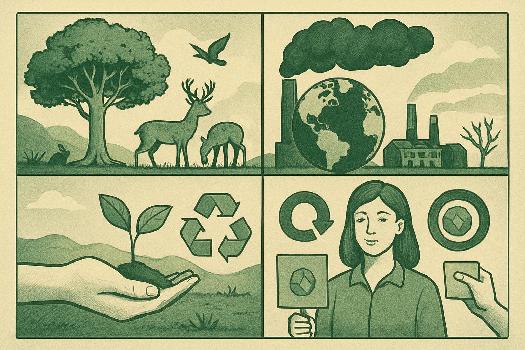Anglais > Vocabulaire Anglais par Thème > L'Environnement (Environment) > La nature (animals, plants, landscapes)
Vocabulaire Anglais Avancé: La Protection de l'Environnement et Biodiversité
Découvrez un vocabulaire anglais plus avancé lié à la protection de l'environnement, à la biodiversité et aux enjeux environnementaux actuels. Conçu pour les lycéens souhaitant approfondir leurs connaissances.

Biodiversité (Biodiversity)
- Ecosystem (Écosystème): A community of living organisms interacting with each other and their physical environment. Exemples: 'The rainforest is a complex ecosystem.'
- Species (Espèce): A group of living organisms capable of interbreeding. Exemples: 'The giant panda is an endangered species.'
- Habitat (Habitat): The natural home or environment of an animal, plant, or other organism. Exemples: 'The coral reef is a vital habitat for many marine species.'
- Endangered Species (Espèce en voie de disparition): A species at risk of extinction. Exemples: 'The rhino is an endangered species due to poaching.'
- Conservation (Conservation): The protection and preservation of natural resources. Exemples: 'Wildlife conservation is crucial for maintaining biodiversity.'
- Genetic diversity (Diversité génétique): the variety of genes within a species. Exemples: 'Genetic diversity is essential for the resilience of populations to changing environments.'
Comprendre la biodiversité est crucial pour appréhender l'impact des activités humaines sur l'environnement.
Enjeux Environnementaux (Environmental Issues)
- Climate Change (Changement Climatique): Long-term changes in temperature and weather patterns. Exemples: 'Climate change is causing sea levels to rise.'
- Pollution (Pollution): The contamination of the environment with harmful substances. Exemples: 'Air pollution is a major health concern in many cities.'
- Deforestation (Déforestation): The clearing of forests for other uses. Exemples: 'Deforestation contributes to climate change and loss of biodiversity.'
- Overfishing (Surpêche): Catching fish at a rate faster than they can reproduce. Exemples: 'Overfishing is depleting fish stocks in many oceans.'
- Renewable Energy (Énergie Renouvelable): Energy that is collected from renewable resources, which are naturally replenished. Exemples: 'Solar and wind power are examples of renewable energy sources.'
- Carbon footprint (Empreinte carbone): The total amount of greenhouse gases generated by our actions. Exemples: 'Reducing your carbon footprint involves making conscious choices about transportation, energy consumption, and diet.'
Il est important de se tenir informé des dernières actualités et recherches concernant les enjeux environnementaux.
Actions pour l'Environnement (Environmental Actions)
- Recycling (Recyclage): Converting waste materials into reusable objects. Exemples: 'Recycling helps to conserve resources and reduce pollution.'
- Sustainable Development (Développement Durable): Development that meets the needs of the present without compromising the ability of future generations to meet their own needs. Exemples: 'Sustainable development aims to balance economic growth with environmental protection.'
- Greenhouse Gases (Gaz à Effet de Serre): Gases that trap heat in the atmosphere and contribute to climate change. Exemples: 'Carbon dioxide and methane are major greenhouse gases.'
- Carbon Offset (Compensation Carbone): A reduction in emissions of carbon dioxide or other greenhouse gases made in order to compensate for emissions made elsewhere. Exemples: 'Buying carbon offsets can help to mitigate the impact of air travel.'
- Eco-friendly (Écologique): Not harmful to the environment. Exemples: 'Eco-friendly products are designed to minimize environmental impact.'
Adopter des actions individuelles et collectives est essentiel pour protéger l'environnement.
Phrases Utiles pour Débattre de l'Environnement
Voici quelques phrases pour exprimer vos opinions et participer aux discussions sur l'environnement:
- 'We need to take urgent action to address climate change.' (Nous devons agir de toute urgence pour lutter contre le changement climatique.)
- 'Protecting biodiversity is essential for the health of our planet.' (Protéger la biodiversité est essentiel pour la santé de notre planète.)
- 'Governments must invest in renewable energy sources.' (Les gouvernements doivent investir dans les sources d'énergie renouvelable.)
- 'Individuals can make a difference by reducing their carbon footprint.' (Les individus peuvent faire la différence en réduisant leur empreinte carbone.)
- 'Education plays a crucial role in raising awareness about environmental issues.' (L'éducation joue un rôle crucial dans la sensibilisation aux problèmes environnementaux.)
Ce qu'il faut retenir
- Biodiversité: Comprendre l'importance des écosystèmes, des espèces et de leur habitat.
- Enjeux Environnementaux: Identifier les principaux problèmes tels que le changement climatique, la pollution et la déforestation.
- Actions pour l'Environnement: Connaître les solutions et actions possibles pour un développement durable.
- Vocabulaire Avancé: Maîtriser les termes spécifiques pour participer activement aux débats environnementaux.
- Engagement: S'informer et s'engager pour un futur plus durable.
FAQ
-
Comment puis-je réduire mon empreinte carbone au quotidien ?
En utilisant les transports en commun, en réduisant votre consommation d'énergie, en mangeant moins de viande et en achetant des produits locaux et durables. -
Quel est le rôle des organisations non gouvernementales (ONG) dans la protection de l'environnement ?
Les ONG jouent un rôle crucial dans la sensibilisation, la recherche, la protection des habitats naturels et le lobbying auprès des gouvernements.
